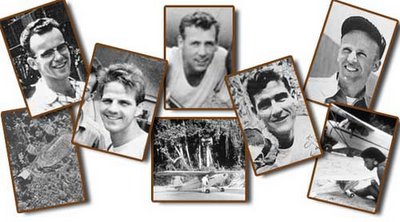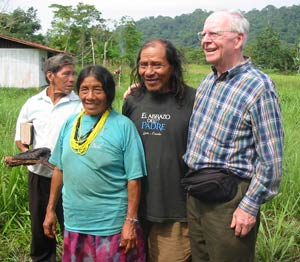
I guess that I should go on record and say that I did go see the movie. While I feel really tempted to write a review of the movie, I have declined thus far. Rather I thought I would say as much about the movie as it does about the gospel of Jesus Christ. So here it is:
There you have it. My review.
Now, on another note, let me take this post to share with you the other end of the spear – the rest of the story which was not told. I am going to quote from three HCJB missionaries – all who were there at Palm Beach for the 50th anniversary of the killing of the missionaries. Their comments and reflections provide a snippit of what made this story so powerful and so life-changing.
I. Ralph Kurtenbach opens with his statement:
Christian believers of the once-feared Waodani  Indians were baptized in Ecuador’s Curaray River exactly 50 years after their forebears speared to death five missionaries attempting to reach the tribe with the gospel. The baptisms took place on the opposite shore near the beach where Jim Elliot, Pete Fleming, Ed McCully, Nate Saint and Roger Youderian were killed on Jan. 8, 1956, by the Waodani.
Indians were baptized in Ecuador’s Curaray River exactly 50 years after their forebears speared to death five missionaries attempting to reach the tribe with the gospel. The baptisms took place on the opposite shore near the beach where Jim Elliot, Pete Fleming, Ed McCully, Nate Saint and Roger Youderian were killed on Jan. 8, 1956, by the Waodani.
Isn’t it amazing to see that the legacy of these five men who where killed in these waters is a legacy about Jesus Christ, about the transformative power of the gospel of God’s grace? The very waters which their blood was shed is not the water on which Waodani are being baptized! Who can attest to this save the cross of Jesus Christ! Kurtenbach further shares about one of the ten Waodani who were baptized on the anniversary:
One baptismal candidate had received Christ through Tementa whose father, Nenquiwui “George,” had misinformed the tribe about the missionaries’ intentions, leading to their martyrdom. Tementa was later instrumental in helping translators produce the Waodani New Testament.
 Ken Fleming, the brother of Pete Fleming (one of the five missionaries killed) was a missionary in South Africa at the time of his brother’s death. Upon hearing the news, one would think that Ken would come off the field, but rather, he stayed and persevered for with same calling which his brother had received. Fleming had the opportunity to meet Kimo – the Waodani who had actually speared his brother. Listen to what Fleming had to say:
Ken Fleming, the brother of Pete Fleming (one of the five missionaries killed) was a missionary in South Africa at the time of his brother’s death. Upon hearing the news, one would think that Ken would come off the field, but rather, he stayed and persevered for with same calling which his brother had received. Fleming had the opportunity to meet Kimo – the Waodani who had actually speared his brother. Listen to what Fleming had to say:
“Kimo, we now know, is the man who definitely speared my brother,” Fleming said later. “It’s just been an absolute delight for me to see the glow of Christ in his face. He and his wife, Dawa, are leaders in the church and have gone on well for the Lord.”
What an amazing story of redemption and reconciliation! And hear how Fleming spoke of the “glow of Christ on his face.” What does he see? He sees the glory of God in the face of Jesus Christ, in the face of Kimo a murderer and now a man of God.
Kurtenbach concludes, “Waodani came by canoe and on foot from half a dozen villages, some walking for three days. Conference speakers spoke pointedly to the third generation since Christianity entered the tribe, challenging teens about their lukewarm response to Jesus Christ.” Let us pray for the younger generation of Waodani who have been not been exposed to the revenge killings but the sheer grace of God and that they would treasure Jesus Christ will kindred faith of their fathers!
II. Harold Foerzen, senior editor of HCJB World Radio, speaks about “Operation Auca” which tells about the real motivation of the missionaries to go and give their lives in Ecuador:
Operation Auca—the vision to introduce the gospel to the once-savage Auca (Waodani) Indians in Ecuador’s Amazon rainforest region—brought together five outstanding young missionaries, all at the peak of their careers.
At about 3 p.m. Sunday, Jan. 8, five of the powerful Waodani warriors speared the five missionaries to death and ransacked the plane on the beach. Although the missionaries had guns and could have defended themselves, they agreed together not to use them against the Indians, even if attacked.
Although the five met a tragic death, their efforts would lead to introduction of the gospel to this once-violent tribe three years later. All five of the Waodani killers became believers, and many of the tribal members now follow Christ. The touching story would also inspire thousands to commit their lives to full-time missionary service, helping spread the gospel to unreached people groups around the world. (emphasis mine)
Here Foerzen says plain and clear what was absent and at best vague in the movie. These men did not go because the government was going to intervene, not because social or political motivations; rather, they went for the sake of the gospel. They did “all things” for the sake of the gospel – all things including the giving of their lives.
III. Finally, Nate Dell, a missionary to the Waodani, shares his personal experience and reflects on the events which took place:
In ways deeper than most Christians understand, Jesus is truly the redeemer and savior of the Waodani, for his story defined a way out of their killing system—the Creator was a Father who allowed His Son to be killed and did not seek revenge.
I believe the story of Ed McCully, Roger Youderian, Nate Saint, Pete Fleming and Jim Elliot was used to impact the world. On the other hand, it’s the story of Jesus that impacted the Waodani. Just as the story of these five now-famous men has rippled down through history to impact generations of missionaries who went into the far reaches of the planet, the story of Jesus has rippled through generations of Waodani life as well.
Unfortunately, the Chrisitans who don’t understand are the ones making the films! “It’s the story of Jesus that impacted the Waodani! Not just the fact that they are no longer killing. Not just the fact that they have become people of peace. No! Behind these facts is the Prince of Peace who was murdered so that peace could have been possible, not just for the Waodani, but all of us outside of Jesus Christ as enemies of God. As Dell spoke to Dyuwi, one of the killers on that fateful day, he reflects on his conversation with him:
 I looked up at his face, startled. Yes, I had heard right—they went on a murdering raid! In my many interactions with this gentle, humble servant of a man, I had forgotten that he had been a killer. In fact, this man had at one time driven a spear into the body of one of those five famous missionaries. I had never felt so poignantly the extent of transformation possible through the message of Jesus and his love.
I looked up at his face, startled. Yes, I had heard right—they went on a murdering raid! In my many interactions with this gentle, humble servant of a man, I had forgotten that he had been a killer. In fact, this man had at one time driven a spear into the body of one of those five famous missionaries. I had never felt so poignantly the extent of transformation possible through the message of Jesus and his love.
Dell follows up with a powerful statement about the continuing legacy of the gospel among the Waodani:
It is often said that the blood of martyrs is the seed of the church. There is little doubt that this is the case amongst the Waodani. Yet in honoring those five men who gave their lives that day, we often forget there are others who came afterward and gave their lives in a different way—not by dying for the Waodani, but rather by living with the Waodani for Christ.
All three of these reports also spoke of the importance of having the New Testament in the mother tongue of Waodani and its impact on teaching and training future generations about Jesus Christ. Also, several Waodani have followed the example of the five missionaries by becoming missionaries themselves to other unreached indigenous peoples around them. Dell adds that Tomo, a Waodani Christian, “had just returned from a five-month journey downriver to preach and teach to some of the more remote villages. He is not alone in his efforts.”
Tomo, you are not alone in your efforts. Brother, you are not alone.
***************************************
To read the entire reports by HCJB World Radio, see the following links:
The Missionary Martyrs
Operation Auca (Harold Goerzen)
Personal Perspective on the Waodani Church (Nate Dell)
Waodani Baptized Where Missionaries Were Slain 50 Years Ago (Ralph Kurtenbach)
timmy, i enjoyed you reviews and postings. take care of yourself and email me sometime. love you both, loli
I really enjoyed the movie. I felt that you gave the movies presentation of the gospel under reccomendation. It was well put, and culturally sensitive. I thought it to be quite beautiful, actually.
Tim,
I saw Saint on Fox News and came to the conclusion that I would not go nor would I take my kids (ages 11 and 12). He was practically begged to share the gospel, yet he described the missionaries’ deaths as a means to “save a people…a culture” from Shell Oil and from their own violence. Of course the gospel did and is transforming their culture…one person at a time. I won’t be seeing it until it’s out on DVD (less earnings for the makers).
Jim
(for some reason I couldn’t log in, but my blog is “wishing for Antioch”